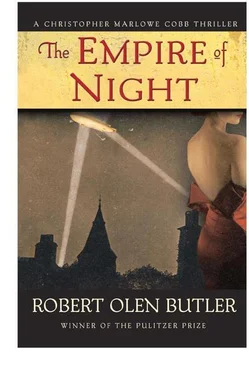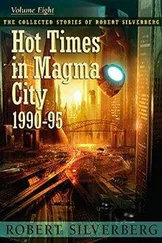“Joseph Hunter,” I said.
“I am Victor Barnowsky,” he said. “Welcome to the Lessing Theater.”
“I don’t mean to intrude on your lunch,” I said.
“Not at all,” he said. “I have matters to attend.”
My mother said, “I told Victor you and I needed to catch up. Your deadline approaches.”
Barnowsky turned to his Hamlet. He clicked his heels and bowed.
Mother led me in silence back the way she’d come, past the wings staircase and along a corridor to her dressing room.
There were two places at the makeup table and mirror. She sat at one of them and motioned me to an overstuffed chair next to a lacquer dressing screen inlaid with mother-of-pearl cherry trees and geisha girls.
Her first words were abruptly in medias res, either from her flair for the dramatic or from a gathering fright at what we were doing; I could not tell which. “I had no choice,” she said. “He woke me and said to pack and we steamed away into the night.”
“I got your note that morning,” I said.
“Good.”
“Are you okay?”
She sat rigidly erect and clapped her hand onto her chest. “Okay? I wish my flesh were too too solid to melt and thaw or drown or be shot or however you spies deal with each other.”
Flair, not fright.
“You sound okay to me,” I said.
“I sound terrified,” she said.
“We need to talk straight,” I said.
Something seemed to let go in her. Her uprightness in the chair eased abruptly. She looked down. She looked back up. “Of course,” she said. “Forgive me for actually enjoying all this.”
“Are you?”
“Yes.” This came out softly. Almost tenderly. Self-reflectively.
I was afraid I knew why.
Before I could ask about Sir Albert, she slipped into what I took to be another place in her mind: “What happened to that man in the courtyard?”
“The dead man?”
“Of course the dead man.”
She had no need to know about Jeremy.
“He fell from the tower,” I said.
“How, for heaven’s sake?”
For a moment I found myself in the same fix Stockman had been in with me on this subject. How to explain it without explaining it. But of course, invoking him was my solution.
“I don’t know,” I said. “I asked Stockman the same thing and all he’d say was that the man was careless.”
She nodded. She looked away from me. Something had come over her I couldn’t identify.
I said, “He was a tough guy in Sir Al’s employ.”
Then it struck me.
I did know what was going on in her.
I said, “Did you ask Stockman about it when you were alone?”
Mother looked back to me.
“Yes,” she said.
What a life I’d lived with this woman. No wonder we couldn’t say anything to each other straight. If it was about anything of importance, I could not hear even a single word from her without trying to read its subtext, hear the persona behind it, figure out if that was really her or somebody she’d simply decided to portray, figure out if there was ever a difference between those two things. Yes , she’d just said. And my first reading, my first hearing, my first figuring all told me that she was in love.
Or thought she was.
Or was playing at being.
Or just trying to test me. Or torture me.
Or all of that.
“And?” I said.
“He wept.” The tone in her voice was familiar. From her two recent yes es. Soft. Not a whisper, but only a few vibrations above one. That tenderness again.
I thrashed about for something to say but nothing was coming to mind.
Then she said, still softly, “Is he an actor, do you suppose?”
Worse yet. She asked this as if she feared it. Her feelings for him were real, not put on out of a sense of drama.
I asked myself the same question. Last night seemed to offer a clear answer. But I was reluctant to admit it.
“Some sort of actor?” she said, pressing the question gently.
I didn’t speak.
“I know what you sometimes think of me,” she said. “But you said we should talk straight.”
I did.
I saw something in her eyes that I’d seen often before about some man or other. But did I really? How do eyes say these things? There seem to be so few variables in eyes. I’d seen this supplicating look, this longing look, this I-need-you-to-believe-me-and-approve look, this I-need-you-to-look-the-other-way look. And in that lifelong, complex, recurring look I also could usually see her own recognition that those feelings I was seeing were, in her heart of hearts, put on. But this look now, in her dressing room at the Lessing Theater in Berlin in a time of war, though it showed all those old familiar things, also showed what seemed to be a new thing.
I would not label it.
Should I talk straight?
“He’s acting to his constituents,” I said.
“Yes.”
“He’s acting to Parliament and to his government. He’s acting when he says he is loyal to Britain.”
“Yes.”
She waited for more.
She knew and I knew and she knew I knew that she was asking this in another sense.
Should I talk straight?
“No,” I said. “I don’t think he’s an actor.”
Tears filled her eyes.
We sat before each other like this for a long moment.
“One more bad guy,” she whispered.
I certainly didn’t expect her to leap to this. I didn’t remember if I’d ever accused her. Of course I must have. It wasn’t just leading men she had a weakness for. It was the bad ones. The drunken ones. The abusive ones. Or so it always had seemed to me.
She tried to shrug. “Of a different sort.”
She turned to her mirror. She picked up a makeup towel and dabbed at her eyes.
She looked at me in the mirror.
“I’m an American,” she said.
“I know you are.”
“I’m a loyal American,” she said.
“I know,” I said.
She turned around to face me again. “But this isn’t America’s fight yet,” she said. “Is it?”
I didn’t say anything to that. Not for the moment.
She was mulling it over.
Then I offered, “That’s what you and I are trying to help our country figure out.”
That didn’t exactly sound straight, even as I said it. Not fully. But it wasn’t untrue.
We still didn’t know what Stockman was up to, exactly. What he believed about country, about blood, about loyalty: these were just beliefs. He lived in a democracy. Mother and I lived in a democracy. We were working on behalf of a democratic society. In a democracy you can have any goddamn belief you want. When does having an idea make you an enemy?
But his beliefs were apparently in service to a country that was at war with a democracy.
What the hell was Stockman up to? With Germany. With my mother.
“What are you saying?” I asked her.
“I don’t know what I’m saying. Except he wept for that dead man in the courtyard and I felt something for him. He is a hard man. I’ve seen that too. But he is equally a soft man. A vulnerable man. Do you know what that does to me?”
“You can back off from straight talk now,” I said.
She stopped.
“I’m sorry,” she said. “But this is all very difficult in ways I never expected.”
“Then the best thing is to figure out exactly what he’s doing here,” I said.
One moment of silence passed between us, our eyes on each other, our circumstance settling in.
Then she said, “Yes.”
This one was not soft.
She said, “He’s meeting someone at four o’clock this afternoon. I wrote down what I know.”
She dipped into the pocket of her knickers and handed me a piece of note paper with the Adlon crest. It read: 11 Schlesische-Strasse, Osthafen, Heinrich Reinauer Gewerblicher Einführer, 4 pm.
Читать дальше












